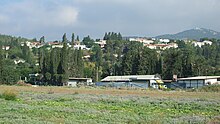Moshava: Difference between revisions
Appearance
Content deleted Content added
No edit summary |
→See also: Tzena, Tzena, Tzena |
||
| Line 10: | Line 10: | ||
* [[Community settlement (Israel)]] |
* [[Community settlement (Israel)]] |
||
* [[Camp Moshava]] |
* [[Camp Moshava]] |
||
* [[Tzena, Tzena, Tzena]] |
|||
==References== |
==References== |
||
Revision as of 21:04, 29 January 2014


A moshava (Hebrew: מושבה), plural: Moshavot (מושבות) is a form of rural settlement in Israel.
In a moshava, as opposed to communal settlements like the kibbutz and the moshav, all the land and property are privately owned. The first moshavot, described as "colonies" in professional literature, were established by pioneers of the First Aliyah in Ottoman Palestine.[1] The economy of the early moshavot was based on agriculture.
Petah Tikva, known as the "Mother of the Moshavot" (Em HaMoshavot),[2] was founded in 1878, four years before the First Aliyah, by religious Jews from Europe. The first four moshavot of the First Aliyah period were Rishon LeZion, Rosh Pinna, Zikhron Ya'akov and Yesud HaMa'ala.[1]
